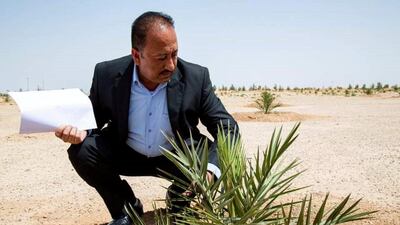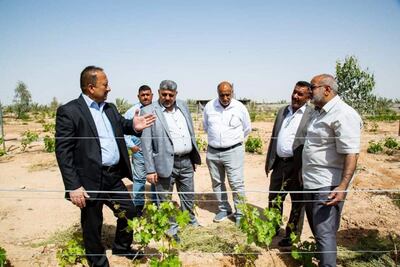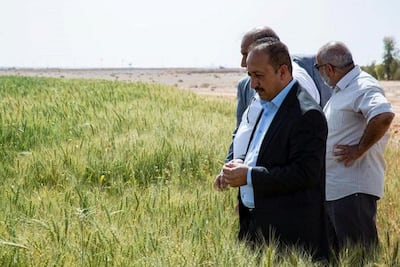Activists and farmers in Iraq are battling to revive the country’s date palm sector, which has been hit hard by decades of war, mismanagement and drought.
In the 1950s and 1960s, Iraq was the world’s top producer of the sweet dried fruit, with nearly 32 million date palm trees growing across the country.
But since war broke out with neighbouring Iran in the 1980s, Iraq has lost at least half of those trees, with the government estimating in 2004 that only nine million remained.
Iraq's date palm industry is a shadow of its former self, even as consumption peaks again during Ramadan, when Muslims traditionally end their daily fast with dates.
Farmer Sahib Maki Al Hamdani was part of the country’s flourishing date palm industry during its heyday.
Back then, Mr Al Hamdani’s orchard outside the southern city of Nassiriyah boasted around 450 palm trees of different varieties. The produce was sold not only locally, but also exported to countries like India.
"Now I have only 20 palm trees left," Mr Al Hamdani, a 71-year-old retired teacher, told The National. The farmer blamed droughts and a lack of government support for the industry's decline.
A lack of water in the Tigris and Euphrates has also badly hit date palm crops.
At its peak, Iraq’s annual production of dates reached around one million tonnes, most of which was exported to markets in Asia and Europe.
But by 2003, when the US-led invasion toppled Saddam Hussein’s regime, the country’s annual production had fallen to 200,000 tonnes, according to Agricultural Ministry figures.
That has left the local market relying on imported dates from mainly Iran as well as Jordan, UAE and Saudi Arabia.
Many of these varieties are cheap and that has made it hard for local farmers to compete.
For decades, Albu Hamdan village, where Mr Al Hamdani was born and raised, was known for its sought-after varieties of dates and for its amber rice, famous for its unique aroma and taste.
During the second half of the last century, the village suffered two floods and then drought.
A lack of government support for the date palm industry had “forced the youth to seek better-paid government jobs, mainly in the security forces, because they want to build houses and get married,” Mr Al Hamdani said.
“And from the other side, their families depended on their sons’ salaries, so they migrated to the cities,” he added.
In 2001, Mr Al Hamdani, a father-of-seven, left the village and settled in the city, leaving behind an arid land that produced only two varieties of the 15 he used to plant. The lack of government support combined with drought led to the loss of most of his palm trees.
“Even the dates we produce can’t compete with the cheap ones imported from other countries like Iran, which sell at lower prices in order to get the badly needed hard currency,” he said.
In a bid to revive the ailing date palm industry, Iraq established the Date Palm Board in 2005, with the aim of increasing the number of productive trees in the country to 21 million by 2021.
To achieve that goal, the government offered subsidised fertilisers and insecticides and soft loans to farmers to plant their orchards, as well as facilitations for exporters.
It also established 30 nurseries nationwide to grow new varieties of trees that produce dates in two years, rather than the four or five it usually takes. Infrastructure programs were also launched to build processing and storage facilities.
Despite the deterioration of security in Iraq, both during the years of sectarian bloodshed between 2006 and 2008, and during the rise of ISIS from 2014 to 2017, the push has brought some modest progress.
By the end of 2020, annual production had reached about 735,000 tonnes - an increase of about 15 per cent from the previous year, according to the Planning Ministry’s Central Organisation for Statistics. The number of trees stood at around 17.35 million, the figures show.
But the progress in reviving Iraq’s date palm groves has not reflected on the local market.
Though some farmers and investors have turned to highly-prized date palm varieties like Barhi and Majhool, their production levels are still low, said Hatam Kareem Abbas, General Director of the Agricultural Ministry’s Orchards Department.
Most of the farmers prefer to plant the Zahdi variety that is used for industrial purposes such as fodder for livestock, Mr Abbas told The National. That variety made up 60 per cent of last year's production, he said.
Alarmed by the decline, activist Basheer Al Masoudi started a project three years ago to spread awareness among farmers.
Mr Al Masoudi's Palm Fans in Mesothelioma currently has more than 70,000 followers on its Facebook page, where he encourages farmers to adopt high-tech tissue culture techniques, such as taking tiny samples from date palms to be grown into entirely new trees.
"The goal is to increase the number of good varieties and teach the farmers to use the modern methods adopted by other countries, mainly the Gulf states," Mr Al Masoudi told The National.
Mr Al Masoudi’s project, outside the city of Hilla south of Baghdad, is not only selling palm shoots, but also a place where farmers and experts gather to exchange views. He plans to expand his project to offer consultations and insecticides.
“The issue not only the number of the trees, but it is the low productivity for the tree itself and the lack of good varieties that the farmer can sell in the local market and export,” he added.




